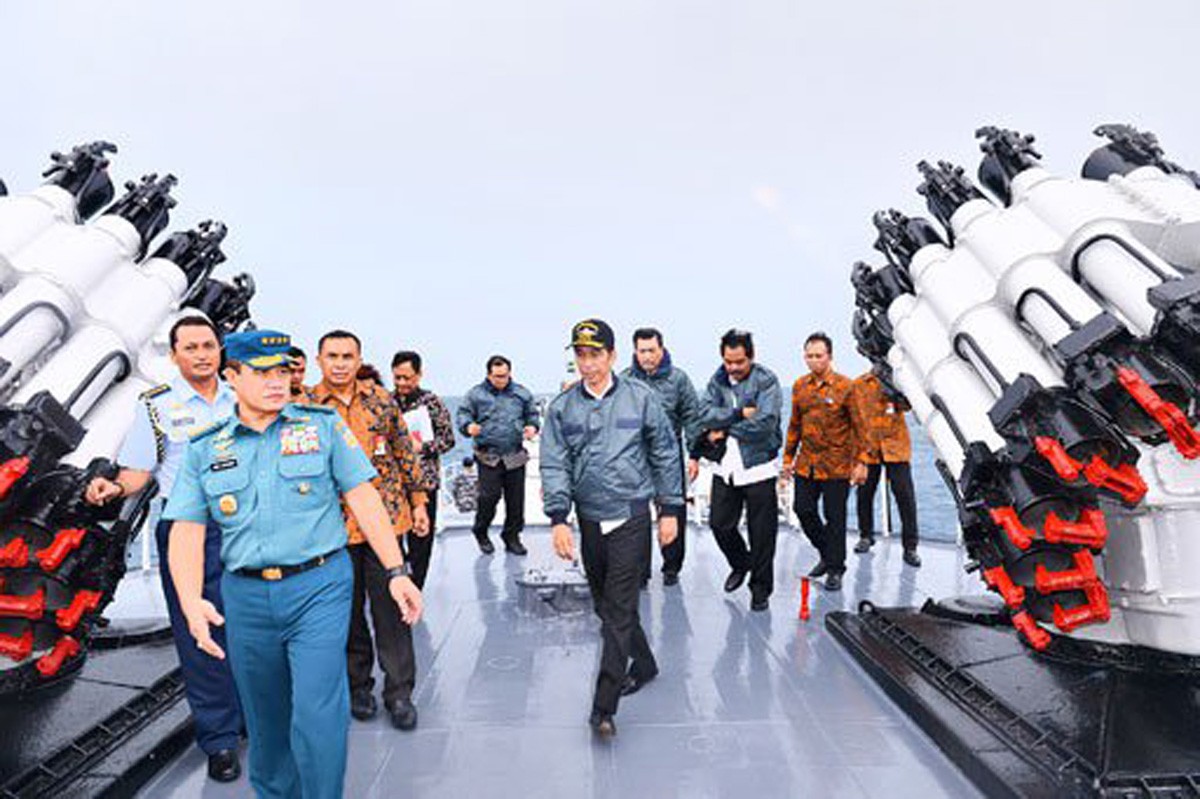Popular Reads
Top Results
Can't find what you're looking for?
View all search resultsPopular Reads
Top Results
Can't find what you're looking for?
View all search resultsIndonesia's take on South China Sea 'White Hull race'
But the question of "What would be a possible trigger for an open conflict in the South China Sea?" should be the primary concern of all relevant decision makers. Is it likely that a military incident would trigger an unwanted clash? Or are there any overlooked non-military factors more likely to start one?The question might have an answer in the development of “White Hull” armadas in the South China Sea.
Change text size
Gift Premium Articles
to Anyone
T
here is no question that Indonesia’s show of military force near Ranai Natuna last October, which included sophisticated maneuvers by the Air Force, invited myriad opinions about it being a statement concerning regional politics. President Joko “Jokowi” Widodo himself looked over the exercise, which sent an even stronger message to other countries that Indonesia's territorial integrity is in good hands. Without a doubt, Indonesia's military assets were shown to be ready for any future contingency.
At the same time, this development occurred during an era of uncertainty on the world stage created by the United States' now-president-elect Donald Trump, especially in the Asia-Pacific region. Meanwhile, geopolitical maneuvers seemed to be required in the South China Sea situation. With a recent statement made by Philippine President Rodrigo Duterte, the visit of a US warship to Vietnam’s Cam Ranh Bay naval base and China's continuing assertions of its territorial claims, it is clear that the military will continue to be a defining element of the South China Sea conflict.
But the question of "What would be a possible trigger for an open conflict in the South China Sea?" should be the primary concern of all relevant decision makers. Is it likely that a military incident would trigger an unwanted clash? Or are there any overlooked non-military factors more likely to start one?
The question might have an answer in the development of “White Hull” armadas in the South China Sea. This idea was echoed by Singapore's Defense Minister Ng Eng Hen on the sidelines of a meeting of ASEAN and US defense ministers in Hawaii recently. In the conference he mentioned that incidents might "have very little to do with military ships" and are more prone to be triggered by developments of coast guards and fishing vessels asserting their country's territorial claims.
The concern is not without proof, as many sources said that China can be seen to be increasingly developing its coast guard's capacity. Other primary players, such as the US, seemed to be already alarmed by the development and the US has transferred three of its Hamilton-class coast guard cutters to the Philippines. Those events may contribute to a “White Hull race” in the region.
Indonesia is not an exception, as one of its frigates, the KRI Oswald Siahaan-354, encountered a Chinese Coast Guard vessel while it was arresting a Chinese fishing boat last May. This was not the first instance when Indonesian authorities had to deal with the Chinese Coast Guard, as Indonesian fishing authority vessels reportedly had several encounters with the Chinese Coast Guard while conducting their duties.
It is then understandable that Indonesia needs to be aware of the dynamics of the region. Its current Maritime Security Board (Bakamla) has been boosting its capabilities. Its “Bakamla Integrated Information System” (BIIS) is set to become a sophisticated maritime territorial domain awareness instrument throughout Indonesia’s vast waters.
However, the development of a functioning maritime security agency in Indonesia came with several challenges, as multiple institutions (including the military, police and other non-military institutions) have overlapping jurisdictions. Effective coordination, information sharing and unity of command questions have not yet been resolved among the maritime security stakeholders.
There are at least three important features of a “White Hull race” that Indonesia should be aware of. First, coast guards or other White Hull authorities are prone to becoming disguised paramilitary fleets. In this case, there might be a need for a stronger and more capable White Hull fleet to be prepared for such development.
Second, on the other hand, as coast guards are mostly categorized as non-military institutions, sending a White Hull fleet can also be a more gentle gesture in a conflict situation. Consequently, Indonesia’s White Hull authorities also need to be equipped with crisis handling capabilities as to not spark larger and more severe incidents.
Third, means of communication and protocols to avoid clashes between White Hull authorities needs to be bolstered among the South China Sea stakeholders. China's recent opposition toward including White Hull authorities in the new Code for Unplanned Encounters at Sea (CUES) arrangement with ASEAN countries is something to be concerned about. Such an arrangement needs to be a priority and having a means of communication, such as a meeting of officials from the coast guards and maritime law enforcement agencies, needs to include other stakeholders to ensure it builds a healthy confidence.
Indeed, a form of the "White Hull race" is in place in the South China Sea conflict and it is important for Jakarta to join and become a determining factor in the race.
***
Muhamad Jaki Nurhasya is a Master's degree candidate in science and security at the War Studies Department, King’s College London, United Kingdom. These views are his own.
---------------
We are looking for information, opinions, and in-depth analysis from experts or scholars in a variety of fields. We choose articles based on facts or opinions about general news, as well as quality analysis and commentary about Indonesia or international events. Send your piece to community@jakpost.com. For more information click here.










